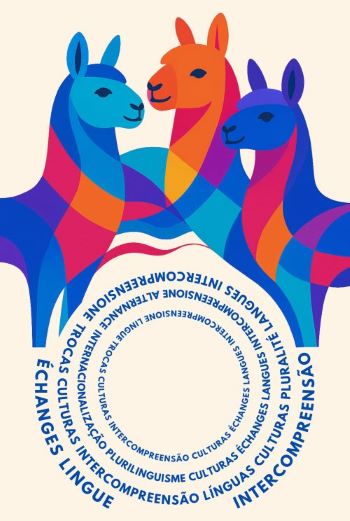The ALPAGA project* (Alternances Linguistiques Plurielles Avec Grenoble Alpes, i.e. Plural Linguistic Alternations with Grenoble Alpes) brings together researchers from two UGA laboratories (LIDILEM and ILCEA4), from USMB, and from other universities in Spain and Italy, as well as collaborators in Brazil and Argentina. The project explores an emerging field in language didactics: plurilingual multimodal exchanges, as practiced in the international telecollaborative trainings of the UNITA European Alliance (UCIL-IC corpus) and in the Romanofonia e cinema telecollaborative sessions (RFC corpus) led by UGA, involving groups from universities in Argentina, Brazil, Spain, France, and Italy.
The project’s work is structured around three main axes : (1) Collection, coding, and analysis of data; (2) Experimentation with and observation of plurilingual mediation practices; (3) Engagement with new, internationally oriented audiences.
This second study day° of the ALPAGA project, taking place on December 12, 2025, will focus on all three axes. It will present the project’s results regarding corpus compilation, data management, and analysis methods and tools. This event will also mark the conclusion of IRGA* funding and prepare for the transition to the FORESEE program**.
The ALPAGA project aimed to produce six deliverables of scientific and/or pedagogical nature:
- A secure, consultable corpus of oral and multimodal data;
- A protocol for corpus creation, storage, and consultation (Data Management Plan);
- A collective scientific publication addressing the project’s core questions, reporting behaviors, strategies, and attitudes in plurilingual exchange situations;
- A multilingual pedagogical guide for integrating institutional groups into plurilingual telecollaborative sessions in different modalities (see https://heyzine.com/flip-book/902d1b5644.html);
- An analysis of the needs of new audiences;
- Scenarios and resources for these new audiences, including staff training, adapted to their language repertoire and specific needs.
Deliverables 1, 2, 4, and 6 are completed or near completion, as is the project website. Deliverables 3 and 5 are underway. The corpus analysis deepens our understanding of plurilingual multimodal exchanges in training contexts, describing them and assessing their effects on engagement, agency, communication, collaboration, cultural dialogue, and language learning.
By documenting these plurilingual interactions and considering both their functional and strategic aspects – highlighting what brings participants together while identifying factors that may hinder interaction or lead to unproductive conflict – the ALPAGA project aims to promote the values of equity, intercultural dialogue, mutual understanding, peace, and democracy, particularly in relation to the consequences of climate change. Ultimately, it seeks to contribute to the development of a plurilingual language policy.
* The ALPAGA project (May 1, 2024 – December 31, 2025) is recognized under the IRGA2024 call (Initiatives Recherche Grenoble Alpes), funded by UGA, Grenoble INP-UGA, ENSAG, Sciences Po Grenoble, and IdEx UGA.
** The REPLI4C project (January 1, 2026 – December 31, 2028), under the FORESEE program, receives state funding managed by the French National Research Agency (ANR) as part of France 2030, reference ANR-24-RSHS-0003 – FORESEE (4C): Living with the Consequences of Climate Change: informing and building the foundations of a Social Contract.
° For details on the first study day, see https://jealpaga.sciencesconf.org

